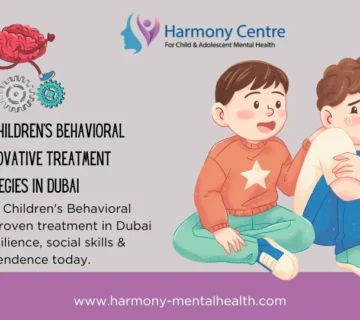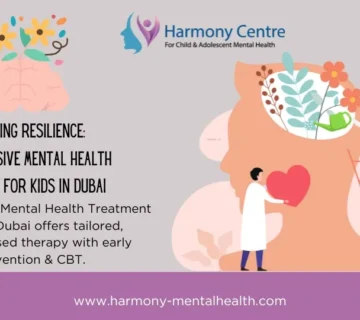Youth Mental Health in Dubai: Challenges, Resources, and Pathways to Wellbeing
Explore youth mental health in Dubai. Discover challenges, initiatives, and resources supporting young people’s wellbeing—learn more about the available support in the UAE!
In today’s rapidly evolving urban landscape, youth face unique mental health challenges. In Dubai, where academic pressures, social expectations, and digital influences intersect, young people often experience stress, anxiety, and emotional struggles. This article examines the mental health issues affecting youth in Dubai, reviews the initiatives and resources available, and offers insights into how families, schools, and community programs can work together to support adolescent wellbeing.
Contact Information
| Contact Method | Details |
|---|---|
| Phone | +971 (52) 8773268 / 04 558 2015 |
| Click Here | |
| info@harmony-mentalhealth.com | |
| Address | Office 409, Building Alrazi-64C, 26th St, Healthcare City, Dubai |
1. The Mental Health Landscape for Youth in Dubai
Dubai is a city of innovation, cultural diversity, and rapid change. With such dynamism come both opportunities and challenges. Adolescents in Dubai must navigate:
- Academic Pressure:
Intense competition and high expectations in schools can lead to significant stress and anxiety. - Social Media Influence:
Constant connectivity and online comparisons contribute to self-esteem issues and emotional distress. - Cultural Diversity:
Balancing traditional values with modern influences sometimes creates identity conflicts and stress. - Rapid Urbanization:
The fast pace of urban life can leave young people feeling overwhelmed and disconnected.
These factors shape the mental health landscape for youth in Dubai. Recognizing these challenges early is crucial for effective intervention and support.
2. Common Mental Health Challenges Facing Youth
Youth in Dubai face a variety of mental health challenges that affect their daily lives:
Anxiety and Depression
Academic and social pressures can trigger anxiety in adolescents. Persistent worry, nervousness, and panic may interfere with daily activities. Additionally, feelings of isolation or inadequacy can lead to depression, characterized by low mood, loss of interest, and fatigue.
Chronic Stress and Burnout
The constant pressure to excel academically and socially can result in chronic stress. Over time, this stress may lead to burnout, affecting concentration, motivation, and overall performance.
Digital Overload
Excessive screen time—spending long hours on smartphones, tablets, or computers—can worsen anxiety and lead to digital addiction. This overexposure often results in sleep disturbances and reduced face-to-face interactions, further impacting mental health.
Identity and Cultural Conflicts
Dubai’s multicultural environment presents both opportunities and challenges. Adolescents may struggle with forming a coherent identity as they balance traditional cultural values with modern global influences. This internal conflict can lead to confusion and emotional turmoil.
Peer Pressure and Bullying
Adolescents often face intense peer pressure to conform, and bullying—both in-person and online—can significantly impact their self-esteem. These negative experiences may lead to social withdrawal and increased anxiety.
Understanding these challenges is the first step toward effective intervention. Early support can help youth build coping skills, resilience, and a positive self-image.
3. Resources and Initiatives Supporting Youth Mental Health in Dubai
Dubai offers a wide range of resources and initiatives aimed at supporting youth mental health. These include:
Youth Counseling and Therapy
Specialized counseling services provide individual and group therapy for adolescents. Common approaches include:
- Individual Therapy:
Tailored sessions using Cognitive Behavioral Therapy (CBT), mindfulness, and other evidence‑based methods to address anxiety, depression, and stress. - Group Therapy:
Peer support groups offer a safe space for sharing experiences and learning coping strategies from others facing similar challenges. - Family Therapy:
Involving the family in therapy helps improve communication and create a supportive home environment.
School-Based Mental Health Programs
Many schools in Dubai are incorporating mental health programs to support students, such as:
- Social-Emotional Learning (SEL) Curricula:
These programs teach students emotional regulation, empathy, and effective communication. - On-Site Counseling:
Many schools have counselors available to provide immediate support and guidance. - Teacher Training:
Educators receive training to identify early signs of mental health issues and create supportive classroom environments.
Community and Nonprofit Initiatives
Several community organizations and nonprofits in Dubai focus on youth mental health. Their initiatives include:
- Peer Support Groups:
Structured groups enable youth to share experiences and develop coping strategies. - Workshops and Seminars:
Sessions educate young people on stress management, digital wellness, and healthy lifestyle practices. - Helplines and Crisis Intervention Services:
Easily accessible resources provide immediate support during times of crisis.
Digital and Telehealth Services
With the rise of technology, many mental health services in Dubai now offer telehealth options. These services provide:
- Convenient Access:
Flexible scheduling and remote sessions that fit busy lifestyles. - Continuous Support:
Ongoing care through digital platforms ensures that help is available whenever needed. - Innovative Tools:
Digital assessments and apps monitor progress and encourage self-care practices.
4. Strategies for Youth to Build Resilience
While professional support is critical, there are practical steps that youth can take to improve their mental health:
Developing Healthy Routines
A consistent routine can provide stability and reduce stress. Youth should aim to:
- Maintain a Regular Sleep Schedule:
Adequate sleep is crucial for mood regulation and cognitive function. - Set Time for Physical Activity:
Regular exercise boosts endorphin levels, enhancing mood and reducing anxiety. - Create a Balanced Daily Schedule:
Allocating time for studies, leisure, and relaxation prevents burnout and helps maintain focus.
Practicing Mindfulness
Mindfulness techniques help youth stay present and manage stress effectively. Some practical practices include:
- Deep Breathing Exercises:
Simple techniques, such as 4-7-8 breathing, can reduce anxiety quickly. - Guided Meditations:
Using mindfulness apps or videos for short meditation sessions can help clear the mind. - Mindful Movement:
Practices like yoga or tai chi combine physical activity with mindfulness, promoting overall well-being.
Building Positive Relationships
Healthy social interactions are crucial. Youth can:
- Develop Effective Communication Skills:
Learning to express feelings clearly and listen actively can reduce misunderstandings. - Participate in Group Activities:
Engaging in clubs or sports helps build social skills and fosters a sense of belonging. - Cultivate Peer Support:
Joining support groups where peers share similar experiences can reduce feelings of isolation.
Managing Digital Consumption
In the digital age, managing screen time is essential. Strategies include:
- Setting Screen Time Limits:
Balancing online and offline activities prevents digital overload. - Digital Detox Practices:
Regular breaks from technology can improve concentration and reduce stress. - Prioritizing Quality Content:
Focusing on educational and creative uses of technology promotes positive mental health.
Seeking Professional Help
It’s important for youth to understand that seeking help is a sign of strength. Professional counseling offers:
- Safe Spaces for Expression:
Therapy sessions provide a secure environment for discussing feelings and learning coping strategies. - Guided Support:
Trained professionals help youth develop effective techniques for managing stress and anxiety.
5. The Role of Parents and Educators in Supporting Youth Mental Health
Parents and educators play a crucial role in fostering youth mental health. Their involvement can make a significant difference:
For Parents
- Open Communication:
Encourage open discussions about feelings and experiences without judgment. Regular family check‑ins can help identify issues early. - Be a Role Model:
Demonstrate healthy coping strategies such as mindfulness and regular physical activity. - Educate Yourself:
Attend workshops or seminars focused on adolescent mental health. Staying informed helps you better support your child. - Support Professional Help:
If needed, facilitate access to counseling or therapy. Your support can increase your child’s willingness to seek help.
For Educators
- Create Supportive Classroom Environments:
Incorporate Social-Emotional Learning (SEL) into the curriculum to help students build resilience and manage emotions. - Be Observant:
Monitor student behavior and identify signs of stress or anxiety early. Early intervention is key. - Collaborate with Parents:
Maintain regular communication with families to align support strategies across home and school. - Provide Resources:
Offer referrals and resources for professional mental health services when necessary.
Together, parents and educators create a robust support network that helps youth navigate challenges and thrive.
6. Real Stories of Transformation
Across Dubai, many young people have experienced transformative improvements in their mental health:
- Enhanced Emotional Regulation:
One student reported a significant decrease in anxiety after participating in a peer support group and practicing mindfulness regularly. - Improved Academic Performance:
Parents observed that their child became more focused and engaged in school after establishing a consistent routine and receiving counseling support. - Stronger Social Bonds:
Teens who participated in group therapy developed new friendships and felt more confident in social situations. - Family Unity:
Families have noted improved communication and reduced conflicts through joint counseling sessions and family workshops. - Long-Term Resilience:
Early intervention has enabled many youth to build coping skills that prepare them for future challenges, contributing to sustained mental wellness.
These stories underscore the impact of comprehensive mental health support and early intervention.
7. Resources and Initiatives in Dubai
Dubai offers a wealth of resources dedicated to youth mental health. Some key initiatives include:
Professional Counseling Services
Specialized youth counseling centers provide personalized therapy for issues like anxiety, depression, and stress management. These services often include both individual and group therapy options.
School-Based Programs
Many schools in Dubai have integrated mental health programs, including SEL curricula, on-site counseling, and teacher training. These initiatives help create a supportive educational environment.
Community Initiatives
Local community centers and nonprofits in Dubai run peer support groups, mental health workshops, and recreational activities aimed at promoting resilience and well-being among youth.
Digital and Telehealth Platforms
With the rise of technology, many mental health services now offer telehealth options. Virtual counseling, online assessments, and digital wellness apps provide accessible, continuous support for youth.
8. How to Get Involved: Steps to Support Youth Mental Health
If you’re concerned about the mental well‑being of a young person in Dubai, consider taking these proactive steps:
- Recognize the Signs:
Monitor for changes in mood, behavior, or academic performance. Early detection can prevent issues from worsening. - Consult a Professional:
Seek an evaluation from a qualified youth counselor or therapist. A comprehensive assessment will help identify specific challenges and guide intervention. - Engage with School Resources:
Talk to your child’s teachers and school counselors. Inquire about available mental health programs and support services. - Explore Community Programs:
Look for local support groups or workshops focused on youth mental health. These programs provide additional resources and peer support. - Utilize Digital Solutions:
Consider telehealth services for flexible and continuous access to mental health care. Digital platforms can offer immediate support when needed. - Stay Informed:
Follow local initiatives and mental health resources through organizations like the Dubai Health Authority. Being informed ensures you have access to the best available support.
Taking proactive steps can significantly improve outcomes for young people facing mental health challenges.
9. Final Thoughts: Investing in Our Future about Youth Mental Health in Dubai
Youth mental health is not only a personal issue—it is a community responsibility. Supporting the mental well‑being of young people in Dubai means investing in a healthier, more resilient future for all. Comprehensive, integrated mental health care, like that offered at Harmony Centre, empowers youth to overcome challenges, build resilience, and succeed academically and socially.
By uniting families, schools, and community initiatives, we create a support network that enables every young person to flourish. The inspiring transformation stories from Dubai underscore the importance of early intervention and continuous support.
If you’re ready to support your child’s mental health and build a resilient future, explore the various resources available in Dubai. Remember, every young person deserves the opportunity to thrive emotionally, socially, and academically.
For further information on youth mental health resources in Dubai, you can visit the Dubai Health Authority website.
Embrace proactive care today—because investing in youth mental health is investing in a brighter future for our entire community.
👉 Book a Consultation Now: Call +971 4 558 2015 or visit www.harmony-mentalhealth.com.
Join our online community and stay updated with our latest events, articles about Youth Mental Health in Dubai



